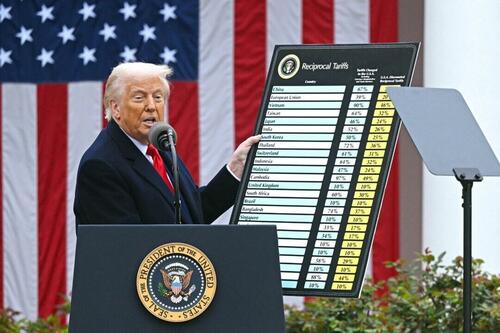
90% Of US Companies Plan To Reshore Amid Tariffs, Allianz Survey Finds
Authored by Tom Ozimek via The Epoch Times,
Nine out of 10 U.S. companies say they expect to bring some or all of their production or sourcing back home in response to new tariffs imposed under President Donald Trump’s trade policy, according to the latest Allianz Trade Global Survey.

The survey, published on May 20, hints at an acceleration in reshoring efforts as U.S. firms adapt to the tariffs, as Trump pursues a global trade reset to boost domestic manufacturing and correct what he says are decades of unfair practices by other countries that put the United States at a disadvantage.
Allianz researchers found that roughly 90 percent of U.S. companies plan to reshore or switch to domestic suppliers in the wake of the April 2 global tariff announcement. U.S. firms ranked among the most likely in the world to pursue domestic sourcing, alongside companies in Italy and Spain.
“That said, it may be easier said than done,” the Allianz report’s authors wrote.
“When asked about the top hurdles standing in the way of reshoring, supplier-related issues and no longer higher costs was the top choice compared to last year. Labor-related issues round up the top three hurdles.”
More than three-quarters of companies pointed to supply chain structure—their complexity, concentration, or competition—as a key threat to offshore production, with the high share of declared reshoring intentions suggesting that firms see clear benefits to simpler, domestic supply chains in the face of Trump’s trade policies.
At the same time, a majority of U.S. firms say they plan to raise prices to offset the effects of tariffs. Fifty-four percent of U.S. companies said they would increase prices following the April tariff hike, up from 46 percent beforehand.
“In sharp contrast to the optimism seen before the April 2 tariff wave, this year’s Global Survey confirms what we’re observing across markets: uncertainty and fragmentation are becoming structural,” Aylin Somersan Coqui, CEO of Allianz Trade, said in a statement, adding that companies with highly concentrated supply chains and export markets have the highest risk exposure to the administration’s tariff policies.
Since taking office in January, Trump has sought to reshape global trade to protect American workers and encourage domestic manufacturing. He has imposed a baseline 10 percent tariff on nearly all imports, with steeper rates for certain countries, including China, where tariffs remain at 30 percent after a temporary 90-day reprieve from a 145 percent levy.
Trump administration officials argue that, over time, foreign exporters will absorb most of the tariff burden once markets adjust. The Allianz survey paints a different picture—at least for now—with only 15 percent of American companies saying they intend to absorb the higher expenses themselves, well below the 22 percent global average.
While supporters see Trump’s tariffs as a long overdue reckoning, critics say the president’s trade policies risk economic turbulence and higher consumer prices. Some companies—such as Walmart—have said they’ll be forced to pass on some tariff-related costs to consumers, while others—such as Home Depot—have said they won’t, with the Allianz survey pointing to a range of tariff mitigation strategies besides price hikes.
Businesses are rerouting shipments to avoid high-duty ports, sourcing from lower-tariff countries, frontloading imports to beat further hikes, and renegotiating contracts to push customs and currency risk onto suppliers and clients.
“Companies are not standing still,” Coqui said.
“Having navigated successive shocks since 2020, they are once again adapting, diversifying partners, reconfiguring logistics, and embedding risk-sharing across the value chain. In today’s trade environment, success depends increasingly on adaptability.”
Tariff revenues, meanwhile, are surging. The U.S. Treasury reported a record $16.3 billion in customs duties collected in April—more than double the amount recorded a year earlier. The increase helped boost the monthly federal budget surplus to $258 billion, a 23 percent rise from April 2024.
Economists warn that the fiscal gains may be offset by reduced trade volumes over time. The Tax Foundation estimates that a 10 percent universal tariff could raise $2.2 trillion over a decade on a static basis, but only $1.7 trillion after accounting for the expected decline in imports and broader macroeconomic effects.
“The relative price increase in imports will cause a drop in imports as people substitute away from higher-priced tariffed goods toward non-tariffed alternatives,” the group wrote in an April report.
A recent poll of Epoch Times readers shows strong support for Trump’s trade reset, with the majority seeing the tariffs as a fair and necessary step to protect U.S. industry and bolster the nation’s long-term economic independence.
Tyler Durden
Thu, 05/22/2025 – 10:45
